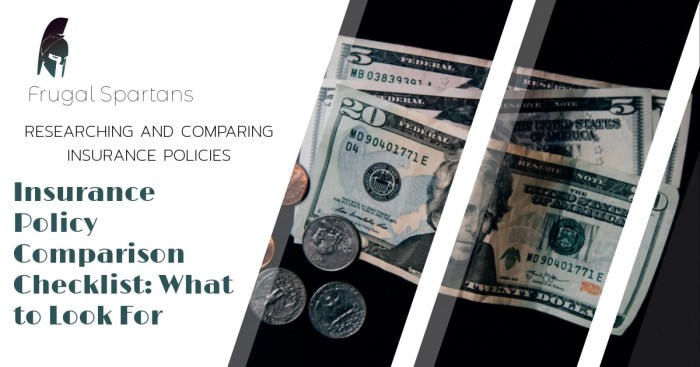Looking for insurance comparison tips? Well, buckle up because we’re about to dive into the world of finding the best insurance deals out there. From understanding the basics to exploring different types of insurance, we’ve got you covered.
Get ready to uncover the secrets of making informed decisions when comparing insurance policies. It’s time to save some serious cash while getting the coverage you need.
Understanding Insurance Comparison
When it comes to insurance comparison, it’s all about finding the best coverage for your needs at the most competitive price. By comparing different insurance policies, you can ensure that you are getting the right protection for yourself, your family, or your assets.
Key Factors to Consider
- Coverage Limits: Make sure the policy provides enough coverage for your specific needs, whether it’s for health, auto, home, or any other type of insurance.
- Deductibles: Consider how much you are willing to pay out of pocket before insurance kicks in. A higher deductible usually means lower premiums.
- Exclusions: Be aware of any specific situations or items that are not covered by the policy.
- Premiums: Compare the cost of premiums across different insurance providers to find the best value for your money.
- Customer Service: Look into the reputation of the insurance company for handling claims and providing assistance when needed.
Importance of Comparing Insurance Options
Comparing insurance options is crucial to make an informed decision. It helps you understand what each policy offers, what you are paying for, and whether it aligns with your needs and budget. Without comparing, you might end up with inadequate coverage or paying more than necessary.
Types of Insurance to Compare

When comparing insurance policies, it is essential to understand the different types of insurance available and how they vary. Here are some common types of insurance policies that can be compared:
Health Insurance
- Health insurance policies cover medical expenses for illness, injury, and preventive care.
- When comparing health insurance, consider factors such as premiums, deductibles, coverage limits, and network of providers.
Auto Insurance
- Auto insurance provides coverage for damage to your vehicle and liability for injuries and property damage caused by an accident.
- When comparing auto insurance, look at factors like coverage options, deductibles, discounts, and customer service.
Home Insurance
- Home insurance protects your home and belongings from damage or theft.
- Consider factors such as coverage limits, deductibles, types of coverage (e.g., dwelling, personal property, liability), and additional endorsements when comparing home insurance.
Life Insurance
- Life insurance provides financial protection for your loved ones in case of your death.
- When comparing life insurance policies, look at factors such as coverage amount, premiums, term length, and types of life insurance (e.g., term, whole, universal).
Factors to Consider

When comparing insurance options, there are several key factors to keep in mind to ensure you are getting the coverage that meets your needs. Understanding how coverage limits, deductibles, premiums, and exclusions impact your policy comparison is crucial in making an informed decision. It’s important to strike a balance between price and coverage to ensure you are adequately protected without overpaying for unnecessary features.
Coverage Limits
- Review the maximum amount your policy will pay out for covered claims.
- Consider your assets and potential liabilities to determine if the coverage limits are sufficient.
- Higher coverage limits may result in higher premiums but offer more protection in the event of a significant loss.
Deductibles
- Understand the amount you will need to pay out of pocket before your insurance coverage kicks in.
- Higher deductibles typically result in lower premiums but require you to pay more in the event of a claim.
- Consider your financial situation and ability to cover the deductible when choosing a policy.
Premiums, Insurance comparison tips
- Compare the cost of premiums for each policy option you are considering.
- Consider how the premiums fit into your budget and whether they provide value for the coverage offered.
- Remember that lower premiums may mean less coverage or higher out-of-pocket costs in the event of a claim.
Exclusions
- Be aware of any specific situations or risks that are not covered by the policy.
- Review the exclusions to understand what scenarios may not be eligible for a claim.
- Consider whether the exclusions align with your needs and potential risks you may face.
Price vs. Coverage
- Consider whether you prioritize a lower price or more comprehensive coverage in your insurance policy.
- Evaluate the trade-offs between price and coverage to determine the best balance for your needs.
- Remember that the cheapest option may not always provide the level of protection you require.
Tools and Resources for Comparison: Insurance Comparison Tips
Finding the best insurance deal can be a daunting task, but with the help of online tools and resources, the process can be much easier and more efficient. These tools are designed to help you compare different insurance options side by side, so you can make an informed decision.
Comparison Websites
Comparison websites are a great way to quickly compare insurance quotes from multiple providers. Simply enter your information once, and these websites will generate a list of insurance options tailored to your needs.
- Popular comparison websites include Insurance.com, Policygenius, and The Zebra.
- Make sure to input accurate information to get the most accurate quotes.
- Compare not only the prices but also the coverage and benefits offered by each insurance provider.
Insurance Agents or Brokers
Insurance agents or brokers can also be valuable resources when comparing insurance options. They have in-depth knowledge of the insurance industry and can provide personalized recommendations based on your specific needs.
- Work with a licensed insurance agent or broker to ensure you are getting expert advice.
- Agents can help you navigate complex insurance policies and explain any terms or conditions you may not understand.
- They can also negotiate with insurance companies on your behalf to find the best rates.





